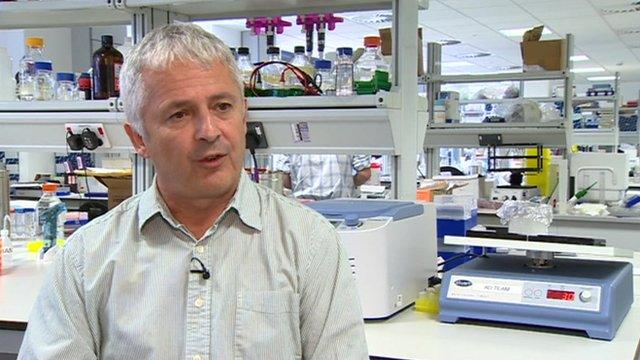'Eighty new genes linked to schizophrenia'
- Published

Researchers from more than 30 countries investigated the genes linked to schizophrenia
Scientists have uncovered 80 previously unknown genes which may put people at risk of developing schizophrenia, research in Nature suggests.
The team says the world's largest genetic study of the disease shows it can have biological causes - putting it on a par with other medical conditions.
Led by Cardiff University, the international group believes this could be a launch pad for new therapies.
Charities say that holistic approaches to the illness must continue.
Scientists have debated the relative role genes play in schizophrenia - a condition which affects more than 24 million people worldwide - for many years.
Now a global consortium across 35 countries has examined the genetic make-up of more than 37,000 people with the condition, comparing them with some 110,000 people without the disease.
'New biology'
Scientists found more than 100 genes that make people more susceptible to schizophrenia- 83 of which have never been pinpointed before.
Many of these genes are involved in the relay of chemical messages around the brain.
And others are known to be involved in the immune system - affecting the body's natural armoury against disease.
Prof Michael O'Donovan of Cardiff University who led the research said: "For many years it has been difficult to develop new lines of treatment for schizophrenia, hampered by a poor understanding of the biology of disease.
"Finding a whole new bunch of genetic associations opens a window for well-informed experiments to unlock the biology of this condition and we hope ultimately new treatments."
Prof David Curtis of University College London and one of the authors of the research told the BBC: "This study puts psychiatry into the same category as other parts of medicine.
"In the past we have struggled with the view that psychiatric conditions are not 'real' illnesses but early genetic studies had limited successes.
"Now we show with confidence that there are biological processes going awry."
Dr Gerome Breen of King's College London who was not involved in the current research but will be working on future studies told the BBC: "I think this is revolutionary.
"We now have a massive amount of new biology to investigate - a whole new set of ideas which could provide many potential avenues for treatment.
"This is crucial. Drug therapy for schizophrenia has not changed significantly since the 1970s."
Promising step
Beth Murphy at the charity Mind said:"Today's research provides an interesting and promising step in the search for more suitable treatment options than are currently available.
"But it is vital that health professionals recognise the need for a holistic approach in treating those who are experiencing schizophrenia and bipolar disorder right now."
- Published22 July 2014

- Published6 February 2014

- Published14 November 2012
